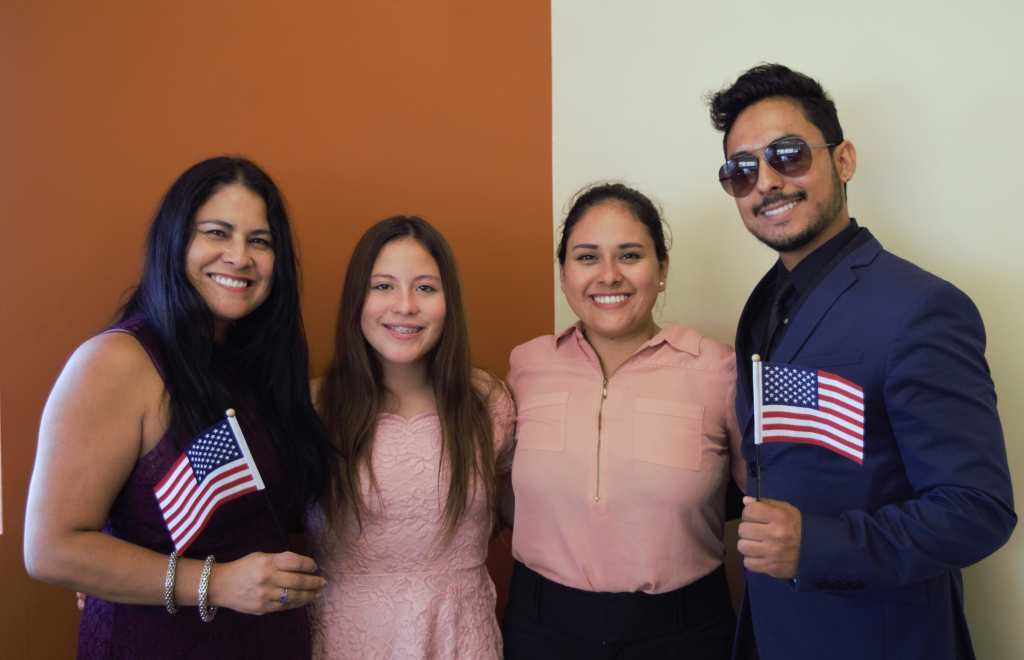News > ILCM In The News
Citizenship: A Family Affair
Posted on Sep 13 2018

Mother and son, Argenis Polo Navarro and Christian Javier Carrillo were among the 875 new citizens sworn in on September 11 in St. Paul. Argenis’s two daughters accompanied them. Erika is waiting for notice of the date of her citizenship ceremony. Valentina, who is still a minor, will become a citizen through her mother.
Argenis and then-three-year-old Valentina arrived in North Dakota in December 2009. Winter was the first shock: in their native Cali, Colombia, the average high temperatures hover in the mid-80s all year around. Small-town life was another shock. Cali has a population of 2.4 million, and Argenis recalls feeling that the small town in North Dakota was like a ghost town, empty of people.
Erika and Christian, both teens at that time, arrived about six months later, so at least the weather was warmer. For them, too, small town living has been a big change.
In a big city, Erika says, you don’t greet people on the street because you don’t know them. But in Thief River Falls, where they now live, “people wave and talk to you, even if they don’t know you!”
Christian watched a lot of English movies before coming to Minnesota, “so my expectation was like Hollywood and then I came here and went ‘What’s this?’”
For Erika, that was good: “When you interacted with people, they were all really nice, not like mean people in shows.”
For Christian, the language barrier was the biggest culture shock. He worked hard, first to learn English vocabulary and grammar, and then to lose his accent. One strategy: “I would try to engage in conversation with elderly people because they would talk at a slower pace.”
Valentina, only three years old when she arrived, picked up the language quickly. All through preschool and elementary school, teachers called on her to be the translator who could help teachers and Spanish-speaking students communicate with each other. Now, she says, she does not have to translate as often.
For Erika, preparing for citizenship means thinking hard about what it means, especially the part of the oath that says: “I will, when lawfully directed, bear arms or perform noncombatant service in the Armed Forces of the United States, or I will, when directed, perform non-military service on behalf of the United States.” The language felt “shocking,” making her think seriously about what it could mean to serve the country.
While the family is happy in their new home, settling in “was a nightmare at first,” Argenis recalls. “Thank God for people who supported us and helped us get through hard situations, especially immigrant health services and immigrant legal services.” She says many people don’t realize that “you can’t just come here and apply for citizenship.” Even after getting green cards (legal permanent resident status), the family had to live here for five years before they could apply for citizenship.
Martha Castañon, in ILCM’s Moorhead office, helped them through the process of getting green cards and, years later, of applying for citizenship. Argenis said her help was essential, and asked to offer a message to readers:
“We are normal people who came to this country and suffered, too, even though we came legally with our visas and did the whole process of work permits and green cards and now citizenship. It wasn’t easy, but it is something possible.
“All of us study and work hard, to give the best of us to this community and country. We did that as legal residents, and now with more reason, as American citizens.
“We want to encourage people to apply for citizenship. Some people say they don’t know the laws. We can recommend Immigrant Law Center of Minnesota to help and guide us through the process. It is very important. Don’t be afraid to reach out to people for help.”
Argenis says she is happy with her life here, and grateful to the United States for the opportunities her family has here. Erika has finished college. Chris will graduate from college soon and is a musician. Valentina, in eighth grade, is already beginning a modeling career and plays sports. Argenis has worked hard in various jobs to support the family, and now works in a hospital as a nurse while also continuing her own college studies. The family belongs to the Evangelical Free Church in Thief River Falls, and their faith is an important part of their lives. Erika has traveled as a Christian missionary, and Argenis does volunteer work in the country jail, with bible studies and Zumba classes.
“We are very happy and proud to be Americans,” Argenis says, “We love and are loyal to this country, but also we keep our countries where we came from in our hearts.”
She found Judge Kate Menendez’s talk inspiring, saying, “I was so thankful what the judge said today. ‘You can keep your culture, your food, your language – you don’t have to change that, it’s part of who you are.’ That was very beautiful to hear that from an American person, an American judge. Some people think you have to forget your country, speaking Spanish, your food – and you can’t forget these. I’m going to keep them in my heart but be loyal to this country, too.”




